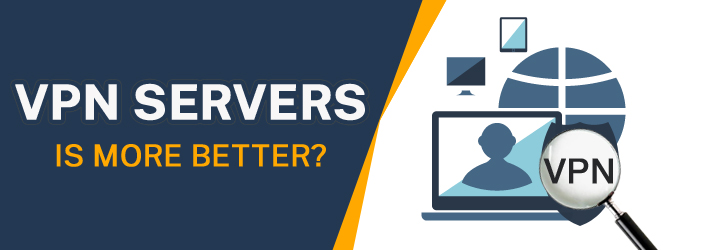
Virtual servers are the focal point of every privacy service and a topic on which we touched many times on this site, in one form or another. The number of VPN servers is one of the first things you see when you open up a VPNs site and a piece of information many users go by when choosing a VPN service. But, just like every VPN service itself, there are a lot of secrets surrounding these services that most users aren't aware of when making their choice. There's a lot more you should know when it comes to this crucial part of every VPN. This brings us to the subject matter of this article – VPN providers claim that more VPN servers is better, but is it really the case? Read this page and find out.
Quality over Quantity
Most privacy-oriented online users know how VPN servers work. These useful combinations of hardware and software blended with VPN technology create a secure tunnel for your connection. By doing this, they mask your real IP, allowing you to enjoy unrestricted internet in complete privacy. These servers can be located anywhere around the globe, and based on how many of them are, they can provide you with unlimited potential, no matter your location.
If we put it like this, the number of servers does seem like the deciding factor that makes a quality VPN. Having said that, while the number of servers is what most VPN services put as one of their main selling points, many other aspects are equally or even more important than sheer server numbers. If you're looking for a quality VPN, here are some other important VPN features you should keep in mind when deciding for a service.
Unlocked Server Features
Most VPN customers use these types of services because they want to hide their activities and sensitive information from third-party observers. Considering this, before choosing a VPN service, you should look for certain signs that will tell you if the particular option is good for you, whether it's streaming, torrenting or any other type of online activity. For example, if your main intention is to get a service for P2P file sharing, the first thing to look for is information on which server offers P2P support.
Since torrenting is illegal in a lot of countries, the preferable option would be to find a server based in a country with lenient torrenting laws. After this, it can also prove beneficial to try to find a server optimized for P2P file sharing over other activities. This will ensure that you get the best results and upload/download performance.
Server Locations
While the number of servers might not be important in itself, the more regions and locations the providers can offer you, the more options you will have to choose a quality option. In this case, the number of servers itself doesn't matter that much, as you should primarily look for the server that's closest to you since it will offer you the best performance. Of course, it goes without saying that if you connect to a server that's based in your country, you will effectively cut down any potential slowdown time.
But, things aren't so clear-cut if you need a US-based server and are located in Europe, or vice versa. When connecting to a remote server, the physical distance between your location and the server address becomes the most important factor. From this perspective, it's better to have a network of evenly-distributed stable servers than to have dozens of options you have to sift through to find a suitable virtual server.
Don't Take Numbers For Granted
In the end, it has to be said that the number of servers does matter, but not always as much as it's talked about. The math behind this is simple – each server can support a certain number of users without sacrificing performance. If more users connect, the VPN will have to expand its server base to satisfy demand. The more servers there are, the connections will be less cluttered and customers can expect stable upload/download times.
In the same breath, more servers also mean exponentially greater expenses for the provider. This can lead to poorly maintained server locations, potentially unsecured servers rented from third parties and a number of other security and privacy threats. With all of this in mind, what can an undecided user do when choosing a VPN? Our advice is to pick a VPN that offers a balanced selection of servers you're looking for. Use the advertized server numbers as basic guidelines of what you can expect and keep a keen eye for all of the server features we mentioned above. If you go by this, you will undoubtedly enjoy a custom-tailored user experience that suits you the most. For more information on choosing a VPN provider, please review our VPN Buyer's Guide.
Share this post
Leave a comment
All comments are moderated. Spammy and bot submitted comments are deleted. Please submit the comments that are helpful to others, and we'll approve your comments. A comment that includes outbound link will only be approved if the content is relevant to the topic, and has some value to our readers.

Comments (0)
No comment